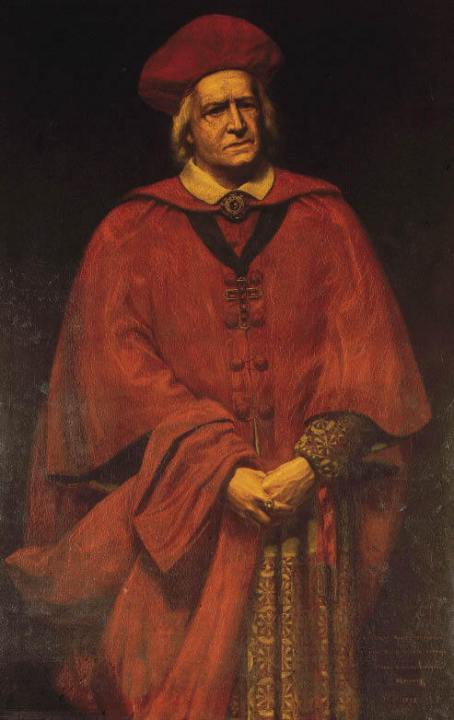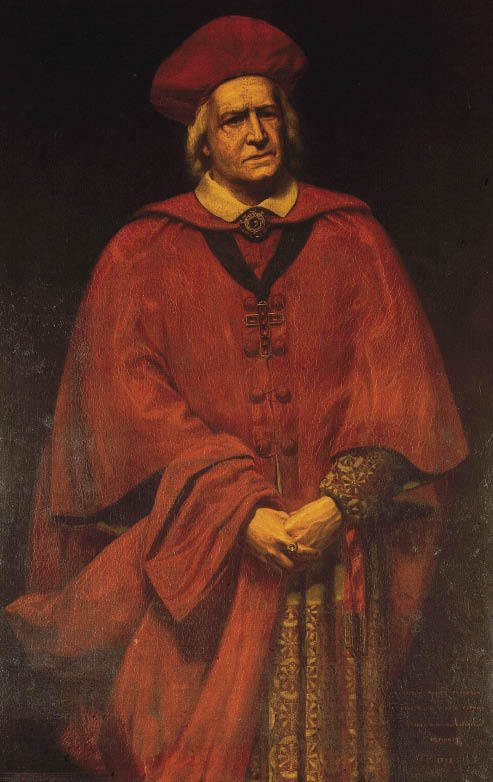The distinguished writer Brian Masters in his handsomely produced book on the actors of the Garrick Club has set himself a formidable task. Not only, until he reaches the mid-20th century, does he have to assess the art of long-dead actors from contemporary accounts; he is also writing a history of the theatrical profession from the time when actors were actually designated, in an 1822 Act of Parliament, ‘Rogues and Vagabonds’, until their gradual edging into respectability. This was symbolised by two events: the founding of the Garrick Club in 1831 and Henry Irving’s knighthood in 1895. Later, Masters enumerates 20th- century Garrick actors, many of whom he has known, and finally addresses club members’ influence over the theatre for more than a century and a half.
He has carried out his daunting task very well. The book is informative, thorough and enjoyable. The first Garrick actor to feature is the great Macready who despised the low status of actors but was as obsessed with his craft and the search for emotional truth as any latterday Stanislavskian. He was prickly, vain and jealous — not someone with whom one would care to have lunch. He invited his great rival, the saintly Phelps, to join his company in order to cast him in inferior roles. Yet, a mass of contradictions, Macready generously helped Phelps when the latter was on the verge of bankruptcy.
Phelps had a great success with his company at the Sadler’s Wells theatre — previously a very seedy venue. He pioneered the playing of Shakespeare’s plays as written, discarding ludicrous ‘improvements’ such as Nahum Tate’s happy ending for King Lear.
Phelps was the idol of the young Henry Irving who, after years of toiling in the provinces, became at the Lyceum the doyen of British theatre. Irving, awkward in movement, with a notably ugly voice and peculiar pronunciations — sight as ‘seyt’, hand as ‘hond’ or ‘hend’ — had an extraordinarily compelling presence. Actors physically and vocally ill-favoured can still be magnetic, like the more recent Nichol Williamson.
Among several other actor-managers Beerbohm Tree stands out for his sheer relish for life and art and wild sense of humour. The half-brother of Max Beer- bohm, he added Tree to his surname, I have always understood, because when audiences called for him after the final curtain ‘Tree’ was much easier to call out than ‘Beerbohm’. His speciality at His Majesty’s Theatre was spectacle. When he leased it out for the long-running Chu Chin Chow he described the costumes as ‘more navel than millinery’.
‘Gentlemanly’ actors like George Alexander also held sway. Later the beautifully crafted natural acting of George Du Maurier had a lasting influence. Anyone lucky enough to have seen A. E. Matthews or Rex Harrison stroll on to a stage, pick up a newspaper and throw away a line as if in their own drawing-rooms will know something of the Du Maurier style. Sir Gerald, incidentally, taught Celia Johnson — as adept at light comedy as she was at middle-class pathos.
When Masters arrives at the near-present he is more controversial and occasionally misleading. It is wrong to suggest that Alastair Sim gave up the stage for the cinema. Good as it is to have his uniquely amusing presence on film, until the end of his life the stage was his first love, and to witness, as I did, his long, woeful figure in full farcical flight in The Magistrate was to see him at his greatest.
In the pointless Gielgud versus Olivier arguments which erupted among spectators in my youth, Masters attempts to be impartial but emerges as a dedicated Giel- gudian. Olivier’s much acclaimed Othello had its strong detractors, but to call it a failure is downright perverse. Gielgud’s undoubted failure in the same role was surely not, as Peter Hall suggested, due to his sweetness of nature, but because he was quite simply physically miscast.
Choosing between actors is ultimately a matter of personal taste: both players were supreme artists who contributed immeasurably to 20th-century theatre. It is fitting that Masters’s story ends with the death of Gielgud in the year 2000.
Despite the author’s attractive optimism the book cannot but sound valedictory. ‘Great actors’, like ‘great statesmen’, no longer exist; perhaps the last was Paul Scofield. Today we have many excellent, even superb, actors — perhaps cleverer than some of the greats. But huge, awe-inspiring presences have all but disappeared. It may be a matter of class: we are no longer such a hierarchical, deferential society as we were. Perhaps the requirements of cinema and television acting have reduced the scale of performances. Critics now are as likely to revere directors as actors. People talked about the ‘Peter Brook Dream’ as they might once have talked about the ‘Irving Hamlet’.
I don’t think that Masters is quite right in suggesting that fiddling with Shakespeare’s texts is finished. Brook, in a reversal of Nahum Tate, cut two moments of hope from his King Lear, thus plunging it into total Beckettian gloom. I have heard of a recent Hamlet in which Ophelia, instead of taking her own life, is murdered, and a Macbeth whose witches were hospital nurses (The Three Ward Sisters?) And Shakespearian speaking has not improved.
Such fogeyish sentiments did not spoil my enjoyment of this book, which is beautifully illustrated with portraits from the Garrick collection.






Comments